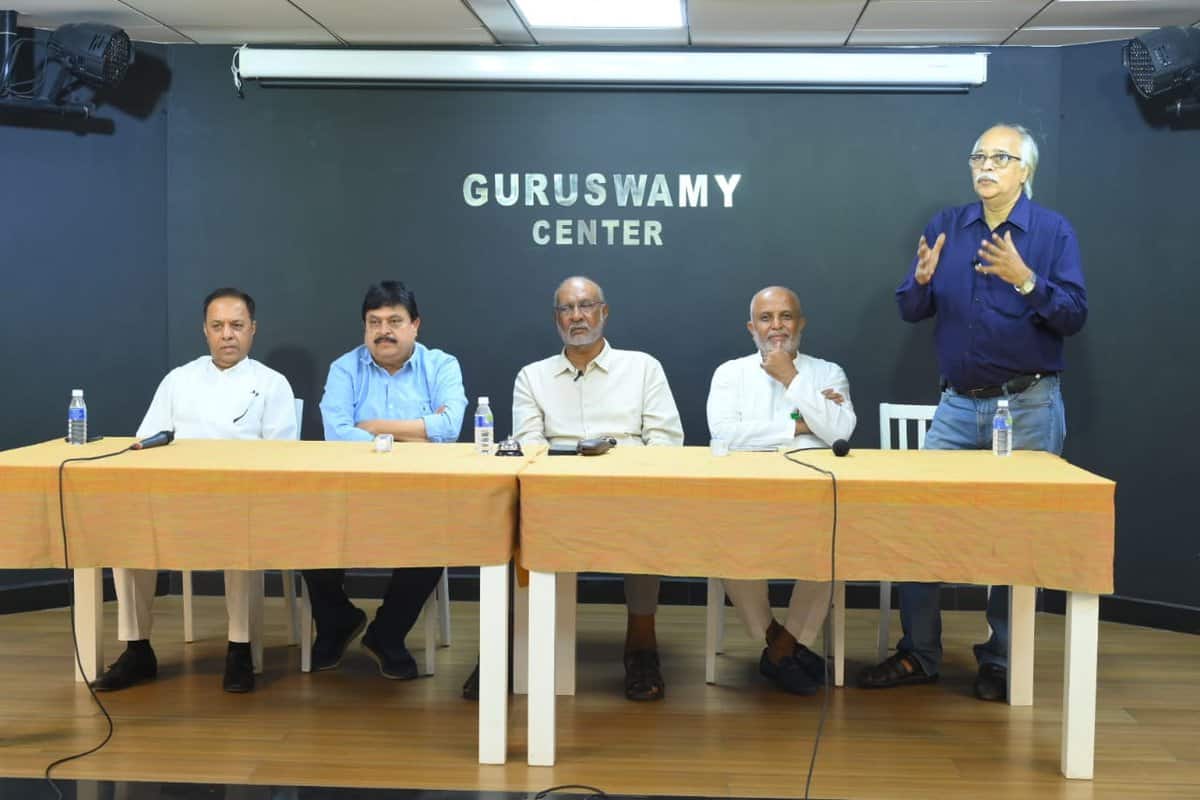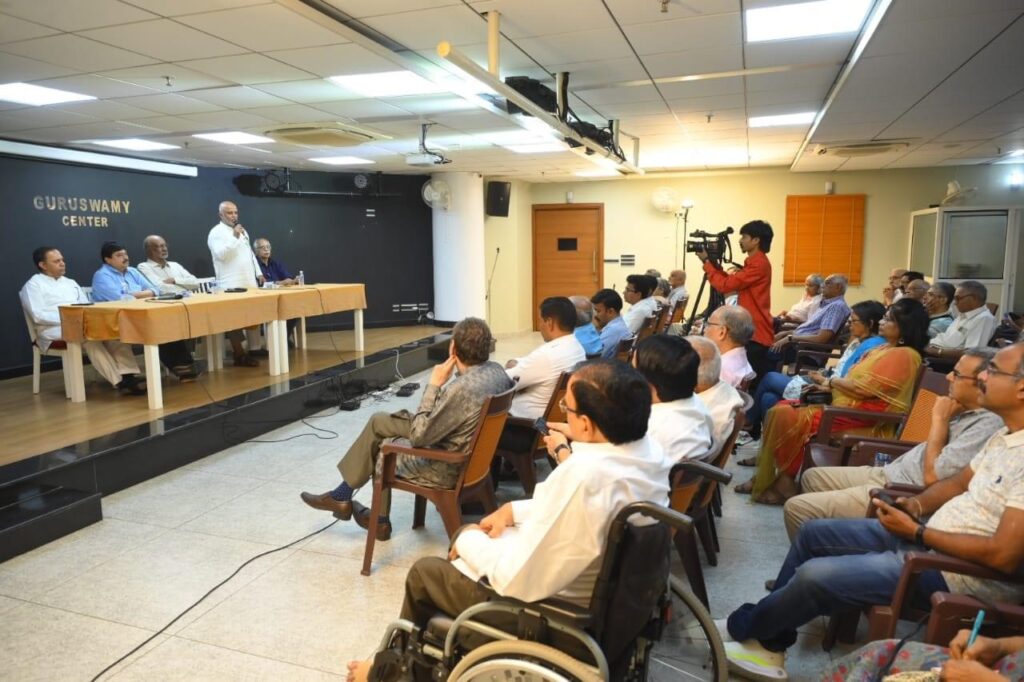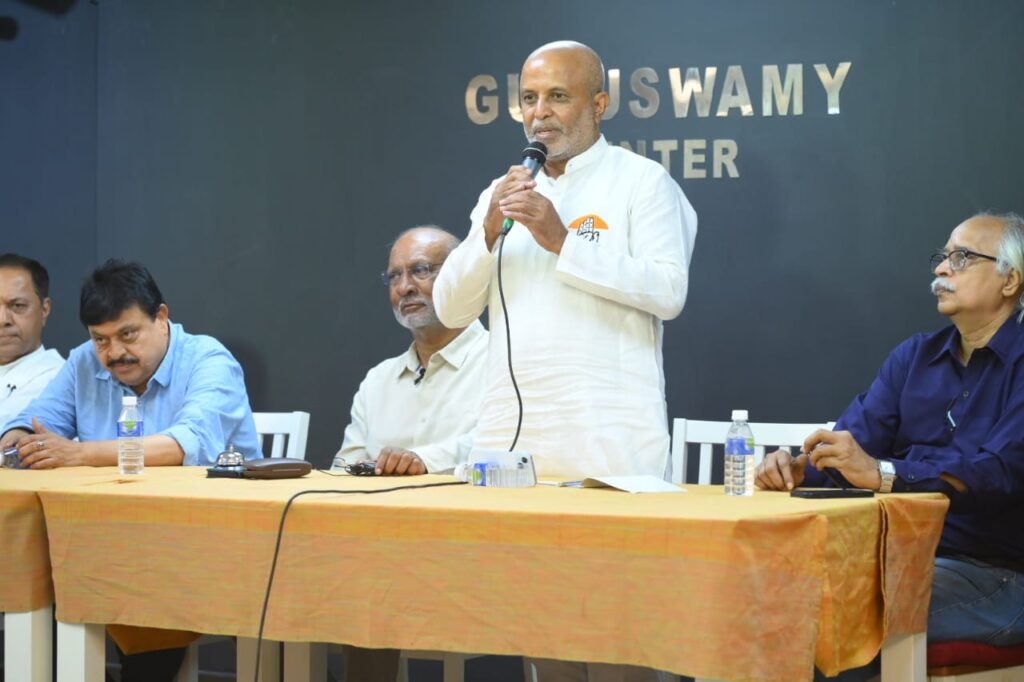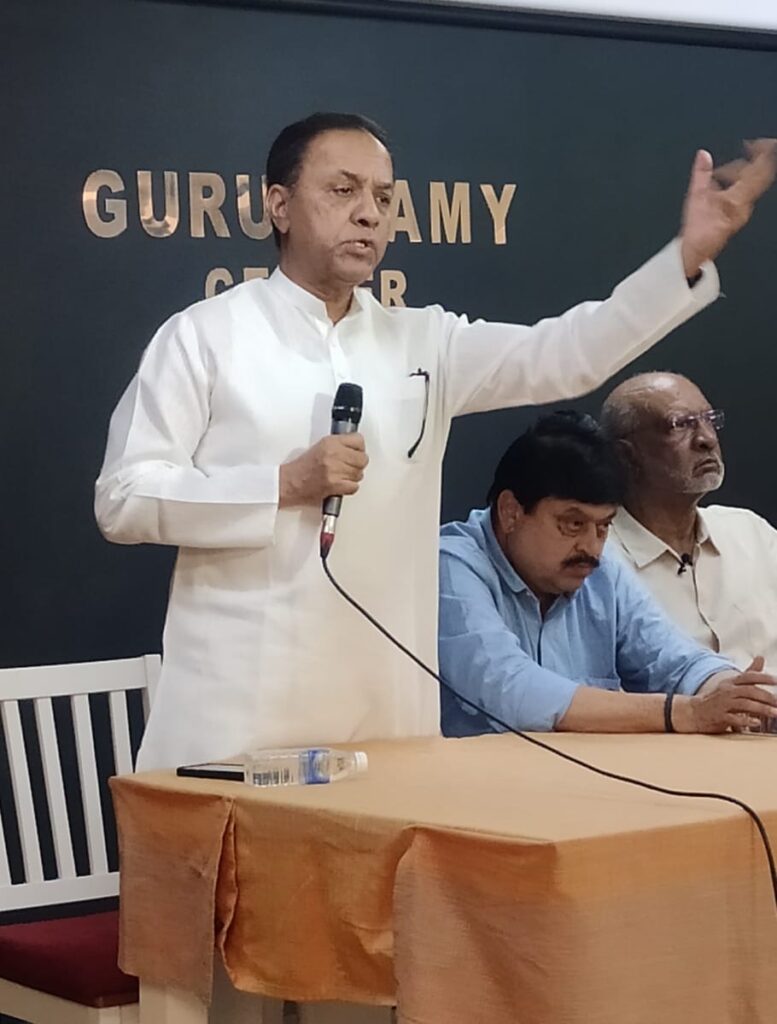
Suresh Reddy summed up the proceedings with the urgent need to revive intra and inter-party democracy through discussions and debates. “We can have differences and bitter fights on the electoral turf, but resolution through discussion of challenging issues in the national interest is a must. In the last 75 years, the country has developed a lot on many fronts. Now is the time to step on the accelerator and emerge a global, economic leader,” he said.
Political debates or discussions turning into a war of words, name-calling, slug fests or high decibel point scoring matches is the norm.
The May Day pre-election 2024 debate at the Guruswamy Center in Secunderabad turned out to be a welcome departure. It was a 150 minute session articulated well by the political leaders and intensely questioned by the audience.

Making the Wednesday evening discussion lively, engrossing and engaging were K R Suresh Reddy, Rajya Sabha MP from the BRS and former Speaker of AP Legislative Assembly; Madhu Yaski Goud, 2-time Lok Sabha MP and present Chairman of the Campaign Committee of the Telangana Congress; N Ramchander Rao, the BJP Hyderabad Unit President and former MLC, and noted economist-political analyst, Mohan Guruswamy.
By presenting their party views, promises, expectations for General Elections 2024 and patiently answering a range of questions from the audience the political leaders succeeded in cooling down the tempers and emotions in the auditorium and brought some respite from the scorching heat outside.
With no wave-Modi, Ram or an anti-incumbency but a savage heat wave across the country, the elections are turning out to be more of a level playing field for the national and regional parties, it appears.
The discussion veered around development issues from jobs to claims of huge infrastructure growth; from religious polarisation efforts to regional party politics and from international affairs to most local issues of Cantonment roads to bad state of basic services like health and education to the poor in Secunderabad and Hyderabad constituencies.

The political leaders were candid in accepting responsibility for shortcomings and forceful on the role of educated people to actively make public representatives and servants accountable and also participate in the democratic process and governance. Money and lures are not just a problem of the rural, less educated voter but also the urban voter they argued.
Madhu Yaski was confident that the Indian voter was inclined for a change. Ten years is enough for the Modi government, which was turning authoritative and failing on many fronts. “Mann ki baat and no direct talk with media or people” was a big negative. Karnataka and Telangana have shown the change and it will reflect in a major impact in the general elections, he argued.
Suresh Reddy presented an impressive record of the 10-year-rule of the TRS, post bifurcation of Andhra Pradesh in 2014 on many development aspects from agriculture, IT, per capita income, quality of living, and provision of drinking water and power supply. He also clearly explained the scope of MPs, and MLAs in solving people’s and public issues, the irritants, and how responsible citizens should be proactive in getting problems resolved.

Contesting the growth Madhu Yaski said it was most visible in the liquor sale and the Telangana policy reached Delhi and led to the arrest of K Kavitha too. Similarly, Telangana youth were not getting jobs and the BRS was empowering caste-professions with support instead of lifting the poor uniformly through appropriate reservations that are implemented sincerely.
In an indirect hint he described Suresh Reddy as the “right man but in the wrong party and was welcome back to his roots in the Cong (I)”.
The veteran BJP leader, N Ramachander made a forceful pitch for a third term for Modi based on the economic growth, infrastructure development, corrupt free administration, increasing global respect, high foreign reserves and COVID management.
However, he ducked questions on the Prime Minister’s comments on Muslims and the politics of polarisation. But Ramchander, a successful lawyer who rose from student leader won the appreciation of not just his co-panelists but many in the audience for his clarity on the proposed Uniform Civil Law, which he argued should be in favour of women and relationships irrespective of religion and in the national interest. He also assured to articulate the problems of civilians and the defence personnel in the Cantonment area as well as the twin cities. The BJP leader was confident of a vastly improved performance of his party in Telangana.
Mohan Guruswamy, who moderated the session, explained that it’s a fact that foreign reserves have surged in recent years but then it does not necessarily benefit the country as much as the investors unless they can be utilised well. The infrastructure growth is evident but the problems in highway toll management were surfacing with one of the implementers just gone missing when questions were raised. The fallout of inflation biting and the huge job crisis facing the country will impact the fortunes of the ruling parties starting from the Modi government badly, he felt.
Who can be an MLA? Why politics is not attracting the youth? Whatever happened to healthy student politics? Why can’t we have public debates without deteriorating to abusive language, name calling and personal attack? Why the influence of big money cannot be reduced and poll reforms brought in so that voting is made compulsory were key issues raised by the very enthusiastic and participative audience.
In a rare coincidence all the three panelists—Suresh Reddy, Madhu Yaski and Ramchander rose from active student politics and leadership. Another coincidence was they are contemporaries and alumni of Osmania University. The grounding has helped us in reaching where we are today, they agreed. In the same breath, they lamented the lack of a healthy political atmosphere or elections and grooming of leaders from colleges. There is a need to debate this.
One major reason for the decline is the neglect of social sciences and rush to engineering, medicine and professional courses that are putting pressure on career and also lack of appreciation of social issues, Ramchander felt.
“Did you assault someone, do you have an allegation of corruption or criminal charge against you, then you are an automatic choice to become an MLA,” This is my answer in a lighter vein, said Madhu Yaski. On a serious note, Madhu, who runs a successful law firm, pleaded for more educated and serious people to take to politics and make democracy active and meaningful. “Don’t shy away, avoid and yield place to unscrupulous leaders who exploit than serve public causes,” he argued.
Suresh Reddy summed up the proceedings with the urgent need to revive intra and inter party democracy through discussions and debates. “We can have differences and bitter fights on the electoral turf, but resolution through discussion of challenging issues in national interest is a must. In the last 75 years the country has developed a lot on many fronts. Now is the time to step on the accelerator and emerge a global, economic leader.”
The session was presented, and speakers and themes were introduced by M Somasekhar, a former Associate Editor of The Hindu Group and an Independent Journalist.



